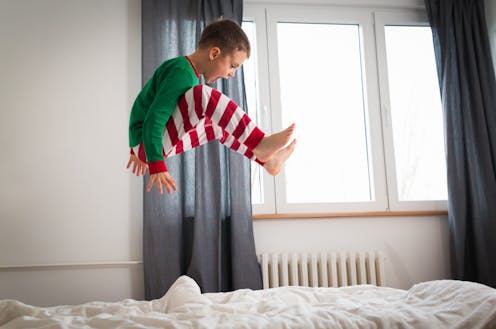Relax – having different sleeping arrangements over the holidays probably won't wreck your child's sleep routine
- Written by Sarah Blunden, Professor and Head of Paediatric Sleep Research, CQUniversity Australia

Sleep, along with diet and physical activity, is one of the three pillars of good health. Good sleep makes it easier to grow, learn, perform, be happy, stay in our best weight range and generally be in the best mental and physical health. This is true for all humans but is particularly important with children.
Regular sleep patterns are important for good sleep. But children and their families often stay with relatives or in holiday accommodation around this time of year. Parents may anxiously wonder: will changing sleeping arrangements during school holidays sabotage good habits formed and maintained during the school term?
For over 20 years, I have researched and treated children sleep problems. The research suggests changing sleep patterns over the summer break does not have to be a problem. And there’s a lot you can do to manage sleep issues during and after the holidays.
Sleeping as a skill
In Australia, as in many western industrialised countries, parents often (but not always) expect their children to sleep alone in their own room and in their own bed.
Up to 40% of families use behavioural sleep strategies to teach their child sleep alone. While such strategies are generally successful in achieving this, it can be hard work for all the family.
Many parents worry that having children share a room or even a bed with their parents over the holidays will become the habit during term time, too.
However, the science says once children have learned a skill, such as sleeping alone, they have a “neural understanding” of that skill. That means their brain has registered, recorded and filed the “memory” of sleeping alone and this is stored for quite a long time.
Short relapses or interruptions to using that skill will not eradicate it in the brief time of a holiday. The child will still know how to sleep alone.
However, they may not want to.
Children may may realise sleeping with parents or siblings is actually pretty great (for them). It may be less fun, however, for the parents (who may not necessarily want to share a bed with a wriggly child, or feel frustrated by seeing siblings who don’t normally share a room, muck around when they should be asleep).
Like many aspects of parenting, it helps for parents to remind their children of the rules at home and guide them back to their regular sleep pattern.
Helping children to understand the co-sleeping or room sharing arrangement may be temporary is helpful. Children can and do learn sleeping arrangements can be different in different places, but the rules stay the same at home.
What if my child won’t sleep at the holiday accommodation?
This is a problem not just because it keeps parents and others from a good night’s sleep. It also deprives the child of sleep.
For some children, particularly sensitive or anxious children, changing sleep routines and particularly sleep environments can really throw them off. These children may find any change very difficult.
When these children are faced with an unknown sleeping environment, they may keenly feel the separation from their parents (who make them feel safe). It can be very difficult and sometimes impossible for them to adjust quickly.
The result may be a child taking a longer time to get to sleep, or long and unsettled overnight wakings. Parents may need to mentally prepare and adjust their expectations.
It may help to prepare the child for the changes. Find out information about sleeping arrangements, before you go to your holiday accommodation. Talk to the child about the sleep set up, who will be there, look at pictures and share the excitement of a new place with the child.
Discuss being scared and anxious with the child and learn some strategies together to help them be brave and calm such as “You will have your favourite bunny with you. And we will just be in the next room”? Or, “We can take our night light from home?” Practise these before leaving on the holiday.
Encouraging and helping your child to be brave rather than expecting them to be brave alone is more likely to result in a smoother transition from home to holiday and back again. Don’t shame them for feeling scared, but try to gently and empathetically help them learn some strategies to cope. Facing a difficult challenge such as changing sleep environments will also teach them resilience.
So parents don’t need to fear any negative repercussions from changing sleeping environments during the summer holidays. Bring on summer and enjoy.
Authors: Sarah Blunden, Professor and Head of Paediatric Sleep Research, CQUniversity Australia





